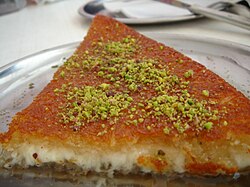 |
| Kunafah is crazy delicious! |
A highlight for me every time I go to the Middle East, is the food. In particular, I love baklava, especially when its made with gooey honey, sun cracked pistachios and golden brown phillo dough.
One day my wife and I walked into one of the ubiquitous sweets shops in Amman to find a man with a well groomed mustache ruling over his abundant world of perfumed, sugary, crispy, bite-sized culinary delights. He smiled at us when we walked in. I mangled a few words of Arabic, in an effort to learn more about what I was looking at. I asked him what you call the cheesy, golden pastry swimming in rose syrup.
"This is kunafah," he replied in perfect English, "there are two kinds: you can have the orange kind with shredded wheat on top, or the brown kind, with crispy flour." We then negotiated a couple of slices of the kind you see pictured above. He chopped and dished them out with the practiced hands of a martial artist. Meanwhile, a line of local patrons formed to stare at the goodies gleaming under the lights, like a line of well trained cats, patiently awaiting their Fancy Feast dinners. We were between them and their desserts, so we quickly got out of the way to have our taste buds assaulted by wholesome Arabian goodness.

I know, I know... this isn't a food blog, but if you sat and meditated for a week before eating kunafah in the Middle East, I'm pretty sure you'd be enlightened the moment it hit your tongue.
What really impressed me about the regal purveyor of Arabian sweets was his presence. In fact, he wasn't the only one that impressed us. There was something special about people working in all of the sweets shops we visited. Every time we went into a sweets shop, we encountered the same friendly countenance and beaming pride over the products on display. I think they take great pride in bringing a little sweetness into the lives of everyone that walks in the door.
The guy dishing out pastries slices kunafah all night long. His work in simple. He isn't going to get rich. He isn't even the owner. Yet, the pride of craft is unmistakable and inspiring. I felt uplifted just looking at his face, and some bliss tasting the fruits of his labor.
It saddens me to say that I don't often see the same kind of pride in Washington, DC. I'm left wondering why every check-out clerk, every bar-tender, and every program manager doesn't take the same kind of pride in his/her work. I'm also reminded of the incredibly well practiced sushi chefs highlighted in the film Jiro Dreams of Sushi. Check out the trailer for that film on the right.
In Shambhala we talk about the dignity of a strong back and a soft front. A noble, upright posture is cultivated over years of practice on the cushion, literally strengthening your back. But in order to manifest true dignity, a strong back is not enough. The front must be soft, meaning that the heart must be open and gentle. We work to soften our hearts that often become cold and hard from the stresses of life.
I came away from my trip to the Middle East greatly inspired by the warmth and hospitality I experienced. Even if we struggle with the conflicts in our environments and in our minds, we can cultivate strong backs and take pride in who we are, whether we are serving food to people, managing multi-million dollar programs, or cleaning our homes.
If I remembered to keep my back straight and took care and mindfulness in everything I did, like the people working in baklava shops in Amman, Jordan, I could bring an uplifted spirit to every person that walked through my door. As simple as it sounds, bringing this kind of dignity to my work might just make the world a better place.
No comments:
Post a Comment